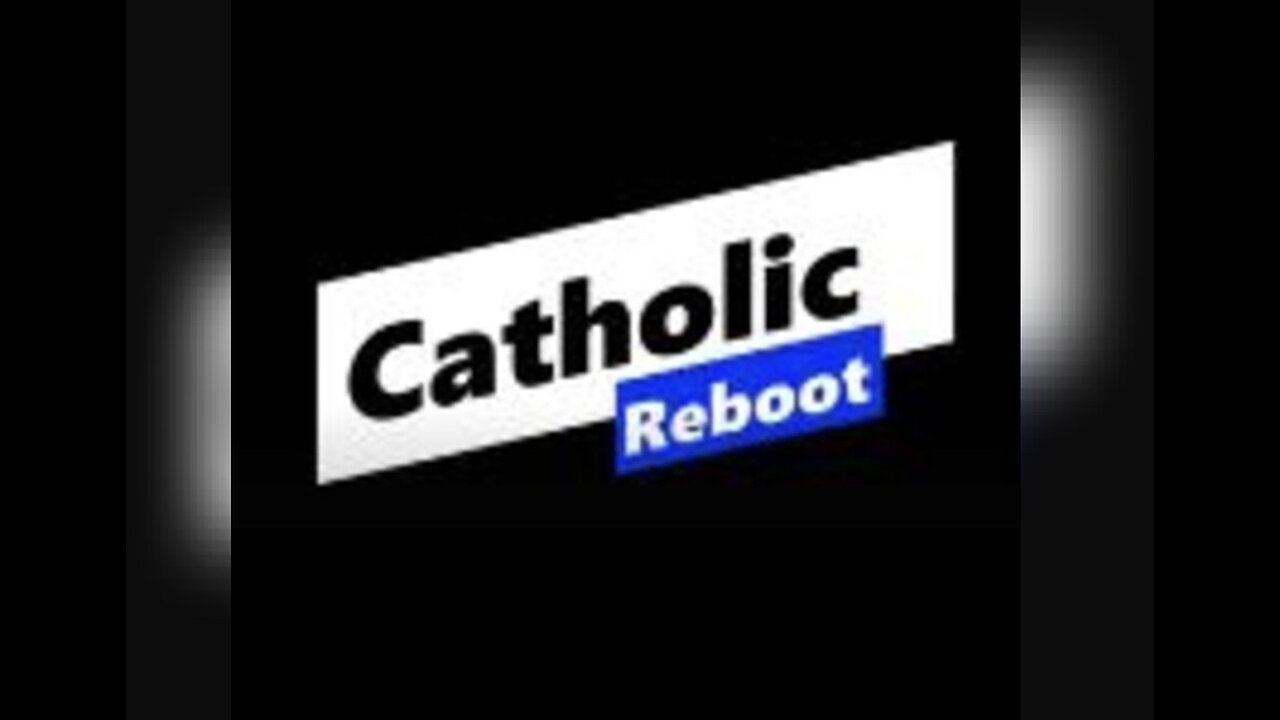Premium Only Content

Episode 1849: What is the Coherence Objection (Christs Natures)?
I want to discuss a topic that may not be for all listeners of this podcast may want to hear because it can go a little too far into the weeds and quite honestly there are certain matters of our faith that truly require faith and not human reason. But this is a topic I have a huge interest in and would like to defend in greater detail so we know why the Chalcedonian Creed (451 AD) was written in the first place. You hear me say over and over again that our Catholic Church is the mystical body of Christ and therefore is of Christ and so when we come to the defense of the church and its teachings how we got there.
Constructive Conclusion to the Coherence Objection Discussion
The Coherence Objection is a challenge to the Catholic doctrine of the Incarnation on philosophical grounds. It focuses on the apparent logical difficulty or inconsistency inherent in the concept of one person possessing both divine and human attributes simultaneously.
Early Seeds:
The seeds of the objection likely surfaced in early Christological debates, where thinkers like Arius (Arian Hersey) questioned the full divinity of Christ, raising concerns about potential contradictions.
The Chalcedonian Creed (451 AD) aimed to settle these debates by affirming both Christ's full divinity and humanity, but questions about their compatibility persisted even to this day.
Here's a breakdown of the key elements:
Core Issue
The objection questions the logical compatibility of divine and human attributes within the same person, Jesus Christ.
Critics argue that it's contradictory for one individual to possess:
• One who knowing everything. It essentially implies possessing unlimited knowledge and awareness. This knowledge encompasses all past, present, and future events, facts, and truths.
• the state of being all-powerful. This implies possessing unlimited power, meaning having the ability to do anything at all.
and eternity (divine attributes) alongside mortality, limited knowledge, and vulnerability (human attributes).
Potential Inconsistencies:
The objection highlights apparent contradictions, such as:
How can an omniscient being also possess limited knowledge?
How can an omnipotent being also experience vulnerability and suffering?
How can an eternal being also be subject to time and mortality?
Implications:
This objection raises doubts about the logical coherency of the Incarnation doctrine, potentially posing a challenge to orthodox Christian understandings of Christ's nature and the Trinity.
Responses and Solutions:
Theologians and philosophers have proposed various responses to reconcile the seemingly conflicting attributes:
Some suggest Christ's divine and human attributes operate independently or compatibly within him.
Others propose nuanced understandings of divine and human nature, emphasizing their complementary rather than conflicting aspects.
1. Emphasize Mystery and Faith:
Acknowledge the inherent mystery surrounding the Incarnation, recognizing that it transcends human logic and understanding.
Emphasize the importance of faith in accepting the doctrine despite the apparent contradictions.
Highlight the theological richness and spiritual significance of the Incarnation, even if its full coherence remains elusive.
2. Explore Alternative Interpretations:
Encourage further exploration of alternative interpretations of the Incarnation that might offer more nuanced solutions to the coherence objection.
Consider the potential of Process theology, which is Process theology is a unique theological framework that emphasizes change, growth, and interdependence as fundamental features of reality, including God. It came about in the early 20th century, drawing inspiration from the philosophy of Alfred North Whitehead. Some key features of process theology include:
God as Process:
God is not a static, unchanging being, but rather a dynamic process engaged in continual becoming and self-creation.
God experiences novelty and interacts with the world, learning and evolving alongside it.
Relationship Between God and World:
The universe is not a creation set apart from God, but rather a co-creation arising from the dynamic interaction between God and the world.
Every entity, including humans, possesses some degree of freedom and creativity, contributing to the ongoing process of becoming.
Implications:
Process theology emphasizes the importance of love, compassion, and justice in responding to the ever-changing world.
It offers a hopeful and dynamic view of reality, suggesting that both God and the world are constantly evolving towards greater good.
Criticisms:
Some find the idea of a changing God incompatible with traditional conceptions of divine immutability and perfection.
Others critique the potential for downplaying the distinction between God and creation.
Consider the potential of Kenotic Christology, Kenotic Christology, derived from the Greek word "kenosis" meaning "emptying," is a theological approach that focuses on the idea of Christ voluntarily emptying himself of certain divine attributes during his incarnation. In simpler terms, it suggests that Jesus, while remaining fully God, temporarily set aside some aspects of his divinity to truly experience human existence.
Key Concepts:
Kenosis: The core idea is that Jesus emptied himself, though the exact meaning and extent of this "emptying" varies among theologians. Some interpretations suggest a relinquishing of divine power, while others focus on limitations in knowledge or self-expression.
Human Experience: The primary aim of kenosis is to understand how Jesus could fully embrace human limitations and suffering despite being divine. This approach emphasizes his genuine humanity and solidarity with humankind.
Reconciliation: Some theologians connect kenosis to the concept of reconciliation. By experiencing human limitations, Jesus demonstrates God's understanding and willingness to share our suffering, paving the way for reconciliation between God and humanity.
3. Focus on Theological Implications:
While the coherence objection raises philosophical questions, ultimately its significance lies in its theological implications.
Discuss how the Incarnation, despite its challenges to logic, shapes Christian understanding of God, humanity, salvation, and love.
Explore how the doctrine informs Christian ethics, social justice, and engagement with the world.
St. Thomas Aquinas on the Coherence Objection:
While we cannot definitively know St. Thomas Aquinas's specific response to the modern-day formulation of the Coherence Objection, we can draw informed inferences based on his writings and philosophical framework. Here's how Aquinas might approach the presented points:
Core Issue:
Aquinas would likely agree that seemingly contradictory attributes reside in Christ, drawing from Chalcedonian Christology that affirms Christ's "whole and complete Godhead and whole and complete manhood." However, he would emphasize that these attributes don't truly conflict within Christ, but rather reside in different "modes of being."
Potential Inconsistencies:
He would emphasize the distinction between divine simplicity and human complexity. God, being simple, possesses all attributes perfectly and simultaneously. Christ, as human, exhibits limitations and change inherent to human nature. These limitations don't diminish Christ's divinity, but instead represent the distinct way divine attributes operate within his human nature.
Aquinas would likely address specific inconsistencies:
Limited knowledge: Christ as human might not know everything at every moment, but possesses divine knowledge by union with the Word.
Vulnerability and suffering: These don't diminish Christ's omnipotence, but represent the chosen mode of divine power acting through his human nature.
Mortality and temporality: Christ's human nature is subject to these limitations, but his divine nature remains eternal and immutable.
Implications:
Aquinas would reject the objection's claim of the Incarnation's logical incoherence. He would argue that reason and faith, while distinct, can cooperate in understanding the Incarnation's mystery.
Responses and Solutions:
While acknowledging the value of nuanced interpretations, Aquinas would likely favor the Model-T mereological view, holding that Christ "borrows" properties from his natures. He might also resonate with Timothy Pawl's concept of "revised truth conditions" to explain seemingly contradictory predicates applied to Christ.
Aquinas would likely caution against interpretations that downplay the reality of Christ's human nature or personhood.
Constructive Conclusion:
Aquinas would likely suggest acknowledging the mystery of the Incarnation while upholding its logical coherence based on his metaphysical framework.
He would emphasize the theological significance of the Incarnation, such as understanding God's love and humanity's potential for redemption.
He would encourage deeper study and contemplation of the Incarnation's riches, recognizing the limitations of human reason in fully grasping its divine reality.
Comparing St. Thomas Aquinas, Richard Cross, and John Duns Scotus regarding the Coherence Objection to the Incarnation reveals different approaches and areas of potential agreement or disagreement:
Areas of Agreement:
Rejection of Logical Incoherence: All three would likely reject the idea that the Incarnation is inherently logically contradictory. They all acknowledge the mystery of the Incarnation but believe it doesn't violate fundamental principles of logic.
Importance of Christology: All three value understanding the Incarnation through Christological doctrines and historical considerations.
Potential Areas of Disagreement:
Metaphysical Framework:
Aquinas relies heavily on Aristotelian metaphysics and divine simplicity. Cross, though influenced by Aquinas, might integrate contemporary philosophical tools. Scotus, known for his Scotist realism, might differ on the nature of Christ's human nature and its relation to the divine.
Human Nature in Christ:
Aquinas might emphasize the distinctness of Christ's human nature, receiving properties through union with the divine. Cross might explore more nuanced possibilities for human nature's role. Scotus, with his distinction between haecceity and nature, might see the human nature as more individualized.
Interpreting Conciliar Texts:
Aquinas and Cross might differ on interpreting specific conciliar passages regarding Christ's operations.
Specific Comparisons:
Richard Cross:
Aquinas might agree with Cross's critique of minimizing Christ's human nature but differ on nuanced approaches to explaining its operations.
Cross's emphasis on avoiding the implication of a personless human nature might resonate with Aquinas.
John Duns Scotus:
Aquinas might disagree with Scotus's Scotist realism regarding the individuation of Christ's human nature.
Scotus's emphasis on Christ's human nature being "formally distinct" from the divine nature might differ from Aquinas's perspective.
-
 4:11:49
4:11:49
Nerdrotic
12 hours ago $34.56 earnedThe Best and Worst of 2024! Sony Blames Fans | Batman DELAYED | Nosferatu! |Friday Night Tights 334
167K29 -
 7:55:51
7:55:51
Dr Disrespect
16 hours ago🔴LIVE - DR DISRESPECT - WARZONE - SHOTTY BOYS ATTACK
220K31 -
 1:30:23
1:30:23
Twins Pod
16 hours agoHe Went From MARCHING With BLM To Shaking Hands With TRUMP! | Twins Pod - Episode 45 - Amir Odom
134K30 -
 1:02:30
1:02:30
Exploring With Nug
17 hours ago $3.85 earned2 Duck Hunters Missing After Kayak Capsizes!
61K4 -
 46:48
46:48
Mally_Mouse
11 hours agoLet's Hang!! -- Opening Christmas gifts from YOU!
70.3K1 -
 44:55
44:55
Athlete & Artist Show
20 days ago $2.04 earnedNHL 4 Nations Snubs, Was Hawk Tuah Coin A Scam?
67.8K -
 33:47
33:47
Stephen Gardner
16 hours ago🔥Pentagon Whistleblower UNLEASHES on Biden and Obama!
123K247 -
 2:20:30
2:20:30
The Dilley Show
17 hours ago $28.43 earnedRoger Stone in Studio plus Q&A Friday! w/Author Brenden Dilley 12/27/2024
100K22 -
 1:57:02
1:57:02
The Charlie Kirk Show
16 hours agoThe Great H-1B Battle + AMA | Lomez | 12.27.24
187K296 -
 11:39
11:39
Russell Brand
1 day agoWhat You're Not Being Told About The Syrian War
183K294